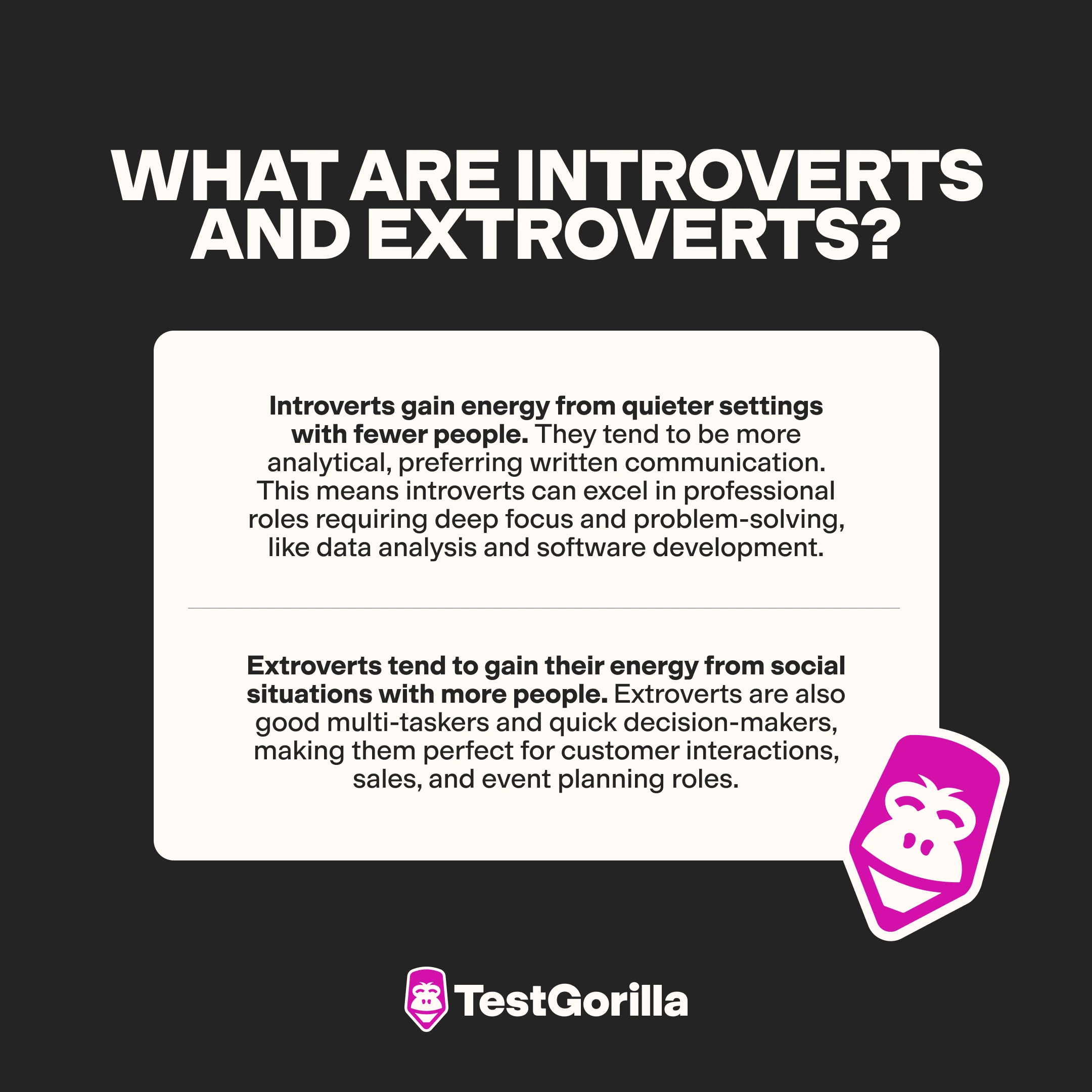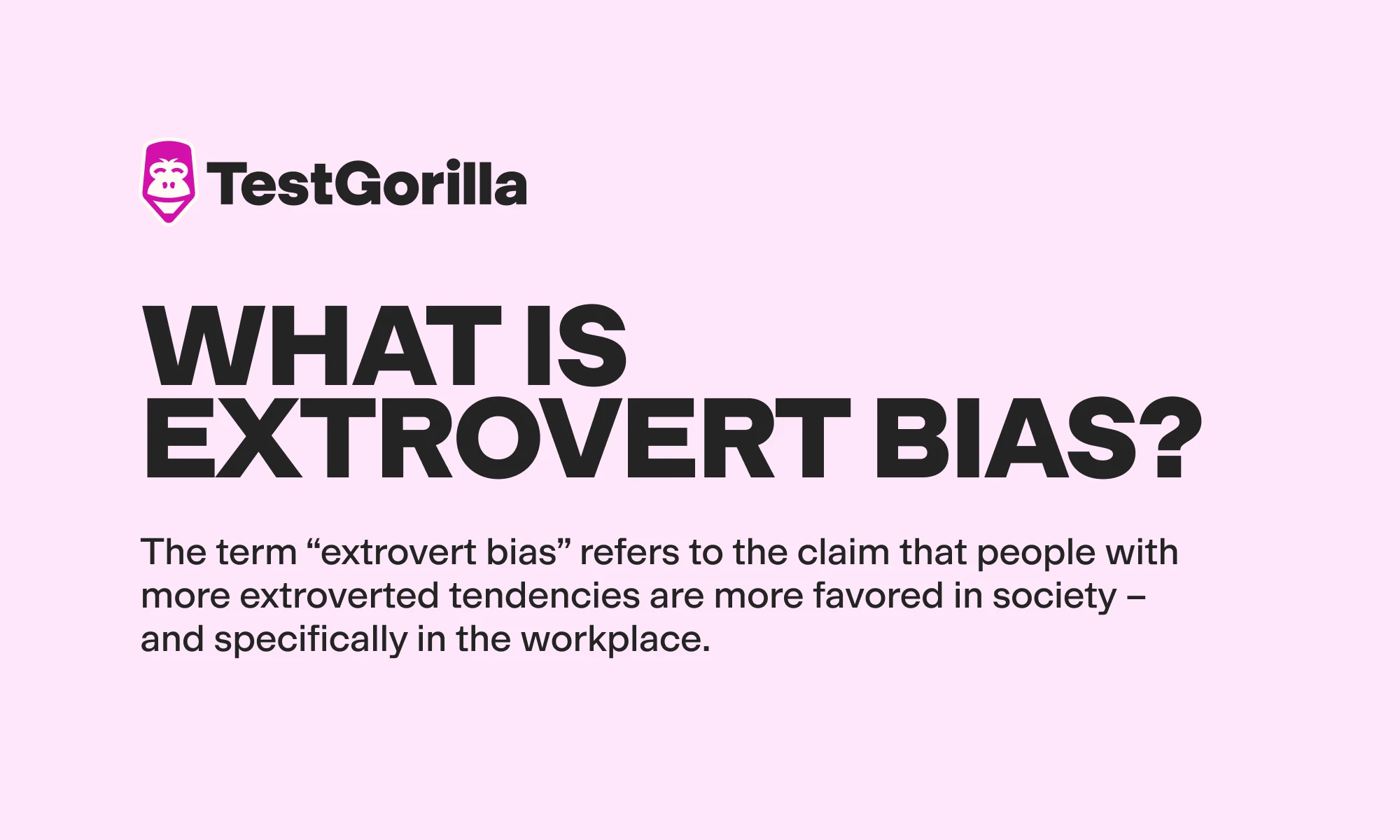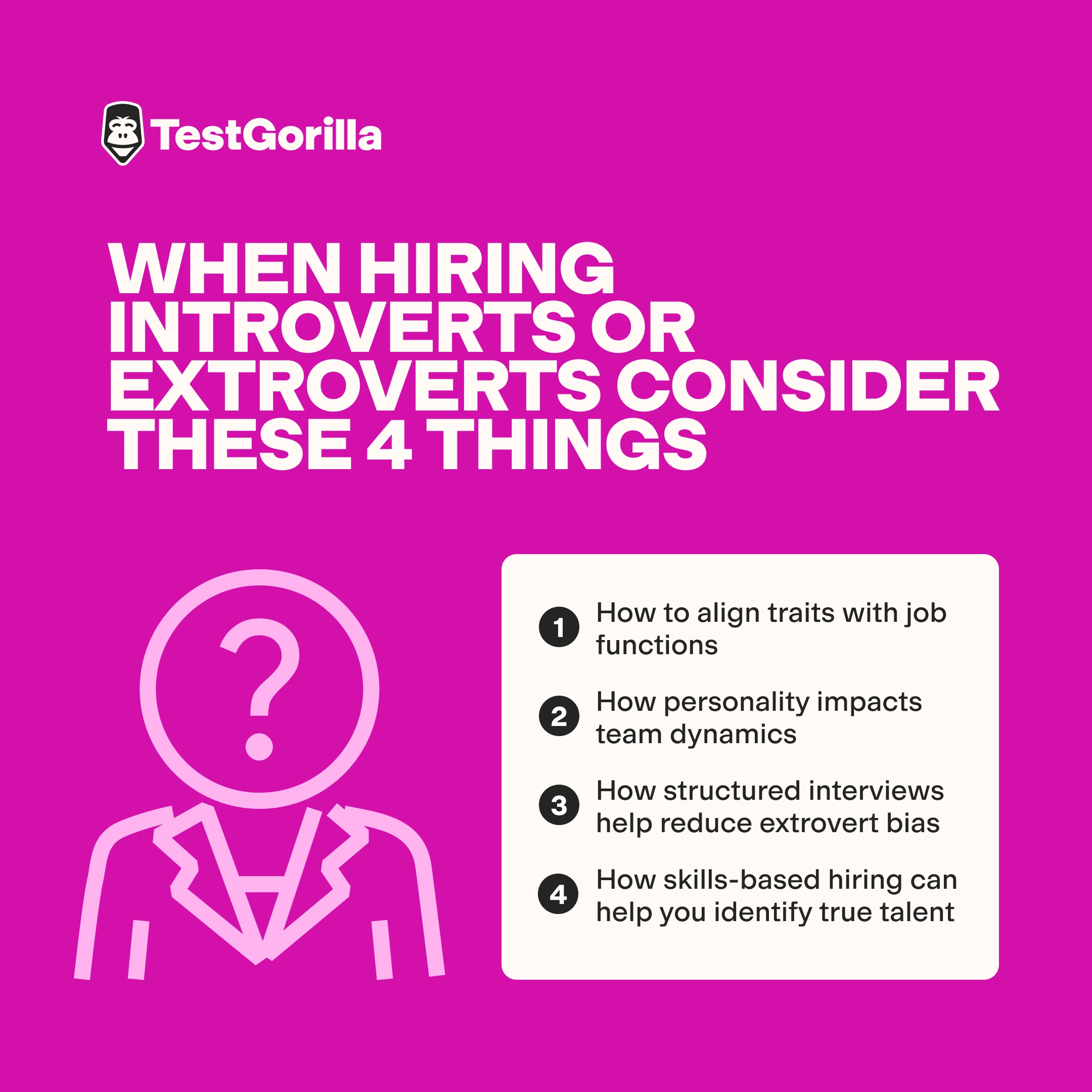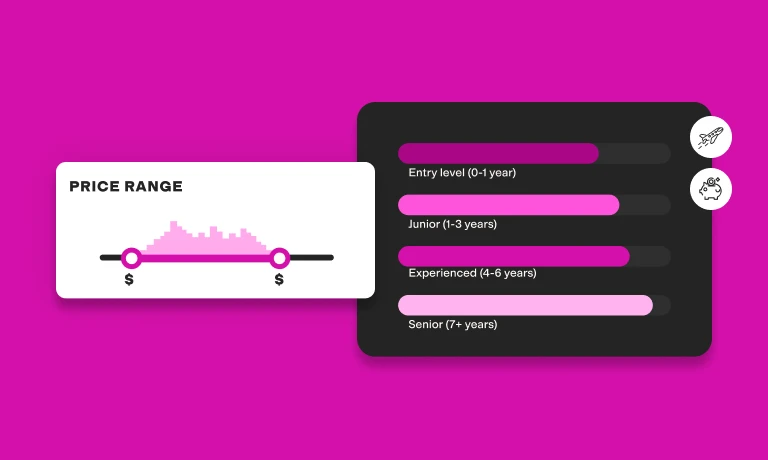When hiring, you might wonder whether personality type matters when selecting a candidate. And if it does, when is it relevant?
Traditional hiring processes often favor extroverts, who are generally more outgoing and confident, particularly during interviews. This bias means you might miss out on a highly-skilled, introverted candidate. And when we consider that 56% of Americans say they prefer introversion, you’re really limiting your talent pool.
But how do you ensure you evaluate candidates fairly while still making the right hire for your team? If you overlook personality, will your new hire fit in with your existing team members, or will they create friction?
In this guide, we cover the definitions of introvert and extrovert, when and why personality types should be considered in hiring, and strategies for creating a hiring system that accommodates both personality types without bias.
Key takeaways
Introverts find their energy from quiet, independent work, which makes them ideal for analytical roles.
Extroverts are energized by social situations, making them perfect for customer-facing and team-related roles.
Traditional hiring methods like resumes and interviews are biased toward extroverts.
Using skills-based testing eliminates biases in hiring and allows you to create a healthy balance of personality types within your team.
Create an inclusive work environment that’s set up for introverts and extroverts to succeed together.
Understanding introverts and extroverts
Perhaps the biggest misconception is that introverts are scared of social situations, whereas extroverts are extremely confident. But the difference really isn’t about fear. It’s simply which environment different personality types feel more energized by.
Introverts gain energy from quieter settings with fewer people. They tend to be more analytical, preferring written communication. This means introverts can excel in professional roles requiring deep focus and problem-solving, like data analysis and software development.
Extroverts tend to gain their energy from social situations with more people. This doesn’t mean that extroverts are always loud and brash, though. It just means that they perform their best when interacting with others. Extroverts are also good multi-taskers and quick decision-makers, making them perfect for customer interactions, sales, and event planning roles.
That said, it’s crucial to understand that nobody is 100% introverted or extroverted. These personality types exist on a spectrum, and everyone has some of both in them. As Carl Jung – the Swiss psychiatrist who came up with the concept of introverts and extroverts – famously said, “There is no such thing as a pure introvert or extrovert.”
Do we subconsciously favor extroverts?
The term “extrovert bias” refers to the claim that people with more extroverted tendencies are more favored in society – and specifically in the workplace.
A few examples show how this could be true.
Imagine you’re having a brainstorming session at work. This relies on coming up with ideas quickly and being willing to say them in front of a group. Quick decision-making, verbal communication, and the social setting of brainstorming favor the extrovert.
People unaware of different personality types may think that introverts who aren’t saying anything during a brainstorming session have nothing to contribute to the team. Of course, this isn’t true. Introverts simply tend to be less likely to shout out in a group. Being aware of this difference helps to stop you from jumping to conclusions about someone and potentially discounting a talented introvert.
Bias toward extroverts can also crop up in the hiring process. Traditional hiring practices, such as resumes and interviews, favor extroverts who are more comfortable talking about themselves. But just because someone talks a good game doesn’t necessarily mean they can deliver when it comes time to do the job.
Interestingly, research also suggests that extroverts’ perceived status slips over time as their confidence becomes seen as motivated by self-interest. This results in extroverts needing to contribute at higher levels to counter these negative perceptions.
This all serves as a reminder that you can’t correct biases by switching favoritism from one personality type to another. You must always keep an open mind and look to hire the most talented person for the job.
The best insights on HR and recruitment, delivered to your inbox.
Biweekly updates. No spam. Unsubscribe any time.
4 things to consider when hiring introverts or extroverts
There are some times when it’s important to consider personality types in the hiring process, and sometimes when you should actively avoid doing so. Here are four things to know so you don’t make any mistakes when hiring introverts or extroverts.
1. How to align traits with job functions
Some jobs tend to favor introverts and others appeal more to extroverts, but remember that nobody is 100% introverted or extroverted. Therefore, you need to be specific in the character traits you’re looking for when writing your job descriptions.
For example, say you’re hiring a data analyst or software engineer. These roles often require deep focus and independent work, which will favor someone who is more introverted by nature. But you won’t say, “introvert needed for a software development role.”
Or, if you’re filling a sales or customer service position, you’ll be looking for someone with quick thinking and strong verbal communication. But you wouldn’t advertise for an “extroverted sales position.”
You have to be clear about the specific types of people who will succeed in the role rather than generalizing about their overall personality type.
If you’re hiring for a role that would suit an introverted personality, use language like “thrives in an independent work environment,” “is comfortable working with minimal supervision,” and “has strong analytical and problem-solving skills.”
For roles that would fit more extroverted individuals, choose language like “thrives in a collaborative team environment,” “is a confident public speaker and presenter,” and “can adapt to change in a fast-paced environment.”
By using specific language when describing character traits, you attract candidates who can really see themselves in these roles. This leads to better hires, as applicants know what’s expected of them before they apply.
2. How personality impacts team dynamics
When it comes to an individual's ability to do a job, their personality type is secondary to their skills for the role. Personality types become more important, however, when you need to consider how individuals will work together as a team.
You can give TestGorilla’s personality and culture fit tests to your existing team to understand what type of personalities make up your team. Then, while you’re evaluating new candidates to join the team, personality tests can help uncover whether or not they’ll be a good culture add.
For example, if you have a team of introverts who excel in a quiet environment, it’s probably not a good idea to throw an extremely extroverted person into the team. The extrovert’s more social nature may disrupt the team environment – which can negatively impact productivity, morale, and more.
3. How structured interviews help reduce extrovert bias
As we’ve discussed, many traditional hiring practices favor extroverted individuals, who often prefer verbal communication and public speaking. Where this shows up most is in interviews – specifically unstructured interviews.
These are more casual conversations without a set of predetermined questions. While this natural, flowing approach can feel like you’re “getting to know” the person, you’re actually risking bias slipping into the process.
As an interviewer, you might subjectively really enjoy having a conversation with an outgoing candidate. But this doesn’t necessarily mean you’ve objectively tested their ability to do the job - they might just be an extrovert who’s very good at interviews.
That’s why you should use structured interviews no matter what type of personality you might be looking for.
Structured interviews have a standard and repeatable list of questions. They center on job-related topics and keep the interview focused. This consistency ensures all candidates are tested on the same criteria – which, in turn, allows you to evaluate them more objectively, comparing like for like across all applicants.
4. How skills-based hiring can help you identify true talent
Regardless of who you’re aiming to hire – an outspoken sales manager or an independent software engineer – a skills-based approach ensures you find the perfect candidate with the right capabilities and characteristics for the job.
With a skills-based assessment platform like TestGorilla, you can evaluate candidates’ role-specific skills and personality traits in an objective way – rather than rely on potentially biased first impressions during interviews. You can even pair job-specific tests with personality tests like DISC, OCEAN, 16 Personality Types, etc., to create a custom assessment tailored to each of your open roles.
How to create a work environment that supports all personality types
Once you’ve made a hire, you need to create an environment where everyone has the best chance to thrive.
This could mean having designated quiet areas for more introverted individuals to work independently with deep focus and open areas where more extroverted team members can collaborate and share ideas.
Of course, you must also ensure your company culture is inclusive of all personality types. A great place to start is with your team-building events.
For example, social outings and games can be a great way to break the ice and introduce new team members, but not everyone will be comfortable participating in these.
Extroverts might be comfortable introducing themselves to the group or even happy to embarrass themselves in the name of fun, but introverts might feel very differently. If introverts feel pressured into doing something they find uncomfortable, you risk pushing them further into their shell rather than opening up.
Invest in more creative team-building activities that incorporate a range of character traits so everyone can shine. An escape room or scavenger hunt are good choices because they require skills from across the introvert/extrovert spectrum. Extroverts will enjoy teamwork and communication, while introverted team members can show their talents in problem-solving and strategy.
Unlock successful hires with TestGorilla
There are some times when it’s important to consider someone’s personality type during the hiring process. For example, you should highlight character traits when writing a job description so candidates can see themselves in the role.
You can also consider personality types when it comes to your company culture and team spirit. You want to make sure your new hire will fit in seamlessly and not create any friction with existing team members.
For the rest of the hiring process, you eliminate any biases related to personality types. This means ditching the old-fashioned, biased resume and interview process and using a hiring process you can trust.
The best way to do this is by following a skills-based approach to hiring and creating objective candidate assessments with TestGorilla. Our science-backed tests can be customized for any role and completely remove any bias, creating a level playing field regardless of personality type.
Create your free account or book a live demo to get started with us today!
FAQs
Is it harder to get a job as an introvert?
Some research suggests that extroverts are favored in the hiring process because of “extrovert bias.” Forward-thinking companies use a skills-based approach to ensure the most talented person is hired, regardless of their personality type.
Do employers want to hire introverts or extroverts?
While there’s some evidence that extroverts are favored during the hiring process due to being more confident in interviews, employers hire introverts and extroverts. Ideally, they’ll hire the person with the right skills for the job, no matter their personality type.
Are CEOs introverts or extroverts?
There’s a common belief that CEOs are mostly extroverts, but this isn’t exactly the case. CEOs generally score highly on both extroversion and conscientiousness. Some well-known CEOs – such as Warren Buffet, Bill Gates, and Elon Musk – all identify as introverts.
You've scrolled this far
Why not try TestGorilla for free, and see what happens when you put skills first.





















